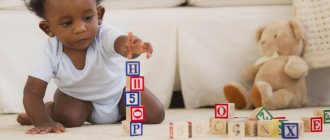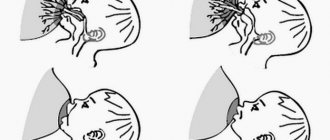Any parents are concerned about the question: when does a child start talking? After all, mastering speech is the most important task that a baby has to cope with. This is not so easy to do: you need to learn to perceive individual words, repeat them and combine them into phrases. Adults should help the baby. But what a joy it is to hear “mom” or “dad” for the first time!
There is no clear answer to this question. Before comparing your child with peers, it is worth remembering: all children are individual. This means that the timing of the appearance of meaningful speech may vary. But it is still important to monitor the baby’s development so as not to miss any problem. Most experts agree that the toddler pronounces his first words between 10 and 12 months, and phrases and sentences at the age of about two. From birth to the moment of full mastery of speech, several stages will pass.
A child's first words
First, the baby imitates, repeating various syllables after adults and sounds after animals. By repeating syllables several times in a row, complete words are formed. However, as we have already said, he pronounces such words unconsciously. After six months he listens and begins to understand adults. Thus, the infant’s passive vocabulary is formed.
Children begin to speak meaningfully by the age of one year. And here an already functioning active vocabulary is formed, when the baby not only understands what adults are telling him. But he also understands words that he understands himself. By the age of one year, the baby’s vocabulary is about ten words; by six months it expands to 15-20.
As a rule, kids begin to understand and say the word give faster, rather than mom and dad. Judging by the statistics, more than half of these children are. The baby happily repeats the sounds of animals, especially if the family has pets. By six months, he can be able to meow, bark and even growl. At the same time, he not only repeats sounds, but also imitates intonation.
A child begins to learn speech from the first days of life. He hears different sounds and speech of adults. Adaptation to the surrounding sound world occurs. Soon the child should learn to distinguish the faces and voices of loved ones who spend a lot of time with the baby. Of course, first of all, this is mom.
Mommy's voice stands out among others. The child quickly grasps its sound. Therefore, it is the mother who should communicate more often and longer than others with her baby and constantly talk to him. Active communication will help master speech, and soon the baby will be able to pronounce the first conscious word.
Tips for parents
The main thing that must be observed in the family where the baby is growing up is: comfortable conditions, routine, love, care, proper speech and psycho-emotional environment.
In the process of education, a sufficient amount of time should be devoted to the development of the child’s cognitive activity, including his speech abilities. Already from the first days of a baby’s life, his organs of hearing and vision are functioning, which allow analyzers to catch sound flashes, facial and articulatory movements of the speech organs. Parents must pronounce all words clearly without changing them. By pronouncing phrases at a slow pace, adults allow the baby to grasp the connection between kinesthetic images of sounds and audible standards.
Advice!
As early as six months, you can accustom your baby to books, reading fairy tales before bed, and looking at pictures. Equally important is the development of fine motor skills, which are directly related to the development of speech. Subtle differentiated movements of the fingers stimulate speech activity. There are many educational games for young children that have a positive effect on all-round development. Communication with your child will help achieve the most positive result.
Also, do not forget about walks in the fresh air. If possible, get used to the TV/tablet as late as possible, even to watching cartoons. Screen speech does not require a response from the child, so it not only does not contribute to speech development, but also significantly slows it down. Watching TV forms involuntary, forced attention in a child, but mastering speech requires voluntary, conscious attention, switching from object to object.
Parents should know that the most favorable and sensitive period of speech development is up to three years. If a child does not experience changes in speech development by the age of three, you should not rely on the words of friends: “Many people don’t speak until they are 3 years old” or “Someone also didn’t speak until they were three or four years old, and then they started talking and it’s completely normal.” developed.” It is necessary to contact specialists and look for problems with the onset of speech, since delayed speech development (SDD) entails many secondary problems, such as delayed mental development, general underdevelopment of speech, and at subsequent school age - dysgraphia and dyslexia, which are difficult to correct. work. Monitoring the development of the baby and taking timely measures is the main responsibility of loving parents in the process of raising a child.
Child speech development
| Age | Characteristics | What does the baby say |
| 1 month | The child communicates by shouting; by the end of the month he will begin to listen to surrounding sounds and respond to speech that is addressed to him | Vowel sounds and combinations, such as a-a, o-o, u-u, u-a, etc. |
| 2-3 months | Sounds acquire emotional overtones; by the end of the third month the baby will begin to gurgle and coo; new intonations appear, the baby waits for a response | Chants vowel and consonant sounds, such as a-a, a-gi, a-gu |
| 3-5 months | Humming is actively developing; the child begins to babble and speak the first syllables; the need to communicate with adults increases; The baby gradually masters the consonants g, k, x, b and p | Various sounds and combinations in different orders, such as ga, gu, agu, agi |
| 6 months | Begins to repeat syllables and understand the speech of adults, which forms the passive vocabulary of children; easily recognizes relatives and friends; babbling is similar to real words, but they are not yet conscious, but are onomatopoeia | Repeats and pronounces chains of syllables, such as ma-ma, pa-pa, ba-ba |
| 7-8 months | The child responds to his name, can change the timbre and volume of his voice, and forms a passive vocabulary; the formation of an active vocabulary begins; the baby understands phrases addressed to him | Pulls out sounds and alternates high notes, imitates animal sounds, such as meow-meow, woof-woof, muuuu, etc. |
| 9-10 months | Masters new sounds and begins to speak the first easy words; speaks gestures, incl. nods his head, waves, points his finger at a person or thing | Clearly pronounces the syllables la-la-la, ta-ta, etc.; pronounces up to 10 monosyllabic imitations of sounds |
| 11-12 months | Begins to consciously speak light words; he understands speech addressed to him, shows parts of the body and face, familiar animals and people | He speaks easy words, including mom, dad, grandpa, grandma, etc. |
| 1-1.3 years | By the first year of life, the baby’s active vocabulary numbers about ten words; at 1.3 years it expands to 15 words | Pronounces and understands easy words (mom, dad, etc.), names of toys, processes and familiar names |
| 1.5 years | The baby knows about twenty words and begins to form two-word phrases; The first verbs appear in the child’s speech, but he still incorrectly uses the genders of nouns, adjectives, and pronouns | Says light words and phrases, such as give me, take a toy, gray bunny, bear fell, etc. |
| 2-3 years | The child knows about 50 words, composes phrases and sentences, changes words according to cases and numbers; remembers short poems and nursery rhymes; the baby fully understands the adult’s speech and can fulfill a double request (take the toy and give it to me) | Makes up phrases and light sentences, pronounces his actions and desires, for example, I went for a walk, I eat porridge, I want to play, etc. |
What to do to make your toddler speak on time
Most parents come to their senses too late and begin to look for ways to “talk” their child. Meanwhile, work must begin from birth. What recommendations do psychologists and speech therapists give?
- Turn off the TV. Excessive background noise harms speech development.
- Talk to the baby from birth. Pronounce the sounds clearly and slowly in a gentle tone.
- Never “babble” when addressing a baby. By distorting sounds in this way, you deprive the baby of correct speech perception.
- Use only simple phrases and sentences. Children ignore long, incomprehensible constructions.
- Become an active interlocutor with your child. Yes, many children talk to themselves, but if they are not supported, they quickly become silent.
- Demonstrate the operation of the articulatory apparatus. In the first months after birth, when the child is just mastering simple sounds, he needs to see how your organs work when producing speech. Speech therapists also recommend this technique: when pronouncing a word or syllable, place your little one’s palm on your lips so that he can feel them moving.
- Don't simplify words. A child will never begin to speak correctly, for example, “car” and “dog,” if his parents repeat “beep-beep” and “woof-woof” after him.
- Immediately call a spade a spade. When faced with some complex word, for example, leopard, parents “simplify” it to “kisi.” But sooner or later the child learns that besides the cat, there are many other animals similar to it - lion, tiger, cheetah, lynx, and each has its own name.
- Answer every little “why” in detail. By denying it over and over again, you destroy your preschooler’s cognitive interest, and next time he will not be interested in a new phenomenon.
Mothers’ favorite pastime, says Komarovsky, is constantly looking for non-existent “irregularities” in their child. Let him develop in his own way and before you know it, he will start talking and catch up with his peers.
How to teach a child to consciously say mom and other words
- Accompany every action with the word mom. For example, mom has come, mom is feeding Seryozha (child’s name), mom is tired, mom is cooking porridge, etc.;
- Play the game “Where is Mom?” Cover your face with your hands and ask the child where mom is. After six months, the baby easily understands such questions and even points his finger at the right person or object;
- When you stroke a child’s head, say that a mother is stroking her daughter or son;
- Use various games and exercises to develop speech and fine motor skills. With children over two years old, you can start reading, learning and memorizing small, short poems. Articulation gymnastics and games of frets with nursery rhymes help a lot;
- When the child says a word consciously, repeat this word after him and praise him;
- Evaluate and encourage any progress in your baby's speech. Praise is the best incentive for development;
- To teach a child, when talking to him, look the baby straight in the eyes;
- To help your baby quickly learn to say a certain word, repeat it more often;
- Using the recommendations listed above, you can also teach your child to say words such as dad, grandpa, grandma, uncle, aunt, and so on. To do this, in your family, try to call each other in the third person. For example, dad came; grandpa, grandma, let's go eat and so on;
- To ensure the correct and full development of the baby, do a regular massage and regularly perform water procedures, engage in sports and physical exercises with your baby. How to massage a baby, see here.
How to stimulate the pronunciation of words at 1 year old
By the age of 1, speech is not yet the most important means of communication for children. It is necessary to teach the baby to use speech. To do this, you do not need to immediately give the toy that the baby wants to take. First you need to say the name of the toy (you can simplify it): “Should I give you a la-la?” Let the baby try to repeat “la-la”, “beep-beep”. When presenting the desired item, you can emphasize: “This is lala, na.”
The vocabulary of an adult communicating with a baby should contain both full and abbreviated words: “kar-kar”, “ding-ding”, “knock-knock”, “tick-tock”. These substitutes for full words are temporary and are needed only because they are easier for the child to pronounce.
In order for children to establish a connection between a word and an action, you need to ask him to perform some action: give or take a toy, show a familiar object, wave a hand. Also verbalize all the actions that he performs with toys. For the same purpose, they play with 2–4 familiar toys and ask the baby, for example, to take a ball, throw it or catch it. Adults carry out all actions emotionally, clearly pronouncing both words-objects and words-actions.
If the child does not speak
Each baby has its own development path. It depends on heredity, temperament and character, gender, developmental conditions and environment, daily routine and even nutrition. Some children start speaking later than others, and there is nothing wrong with that. This behavior is often typical for calm and phlegmatic children.
Experts note that boys, on average, begin to speak one to two months later than girls, but then catch up in a short time. In a bilingual environment, when two or more languages are spoken in the family, it is more difficult for the baby to perceive information, so he may start speaking later. In addition, the development of speech is negatively affected by a monotonous environment and insufficient communication with people. With a lack of communication and fresh impressions, the baby simply has nothing to talk about.
A serious reason for this behavior is stress, lack of emotional contact with parents and various psychological problems. If a child rarely sees and communicates with his mother, this negatively affects the emotional state and psychological development of the baby. Young children acutely feel tension and conflicts in the family. This also negatively affects the development and well-being of the baby.
The most serious causes are severe speech disorders, including aphasia, dysarthria, sensory and motor alalia. Medical problems include congenital anomalies and anomalies of intrauterine development, genetic diseases, and deafness. Such diseases require professional intervention and monitoring.
Why do modern children start speaking late?
Speech therapists, psychologists and pediatricians around the world are sounding the alarm - modern children are starting to speak late.
Experts explain this for the following reasons:
- Environmental change; The air has become more polluted.
- Parents, while raising children, are exposed to emotional and psychological stress, which is immediately passed on to their children.
- Cases of caesarean sections have become more frequent. A baby born in this way is different from others. Deviations are not critical and can be corrected; they require constant attention and effort.
- Replacing live communication with gadgets. At this age, the baby has no need to talk; his entire world is virtual reality.
The most common misconception among parents is the belief that the problem will go away on its own and the child will start talking at school. Reasoning this way, they miss the opportunity to help the baby in time.
Spend time with your children, experience joys, victories and defeats with them, and they will answer you in kind.
When to sound the alarm
- In the first months of life, the baby does not cry;
- At four to five months, the child does not gurgle, does not react to the appearance of his mother with animation or a smile;
- The baby does not listen to sounds;
- At seven to nine months, the child does not recognize the voices of his family, does not babble or repeat sounds or syllables;
- At one year old, the baby does not utter a single word and does not understand speech addressed to him;
- At 1.5 years old, the baby does not speak simplified and easy words, does not respond to comments and requests;
- At two years old, the child does not speak or speech is indistinguishable, the baby cannot fulfill the request.
If you notice such deviations in the development of your child, be sure to consult a doctor. It is necessary to check the hearing and the degree of development of mental functions and skills. Visit a pediatric neurologist and otolaryngologist, speech therapist and psychologist. For a detailed calendar of child development by month, what and when a baby should be able to do, see the link.
Subscribe to our VKontakte group
Complex meaningful sentences
In the period from 2 to 3 years, the vocabulary expands to 300 words , the baby begins to control the volume level, constantly changing it. He actively uses pronouns, sentences consist of nouns, verbs and adverbs. By the age of 3, speech becomes more complex, the child participates in conversations, changing words and tone of voice depending on what and with whom he is talking. Most children know their name and age and can be easily understood.
What is the daily routine of a 3 month old baby? Pediatricians' recommendations for newborn development.
General principles of child development at 5 months, height and weight indicators - https://mamavika.com/razvitie/rost-i-ves/skolko-dolzhen-vesit-rebenok-v-5-mesyatsev.html
How much should you do with your baby?
You need to talk to your child every day. Constant communication will make him more open and talkative. Do not overdo it, because children get tired quickly. They need mental rest, so after every game and conversation they need to be distracted. For example, lie down and listen to music.
There are cases when the speech apparatus develops with difficulty. Parents should watch and listen to how the baby behaves in order to correct the situation in time. Mandatory monitoring is necessary for a child who has chronic or neurological severe illnesses. If the baby does not want to repeat words and sentences, he pretends that he does not hear his parents. When he constantly speaks in his incomprehensible language and shows indifference if his parents do not understand him. And, of course, if the speech of his peers is better developed, which is especially noticeable when he plays with them.
You can share the article with friends via social media. networks:










